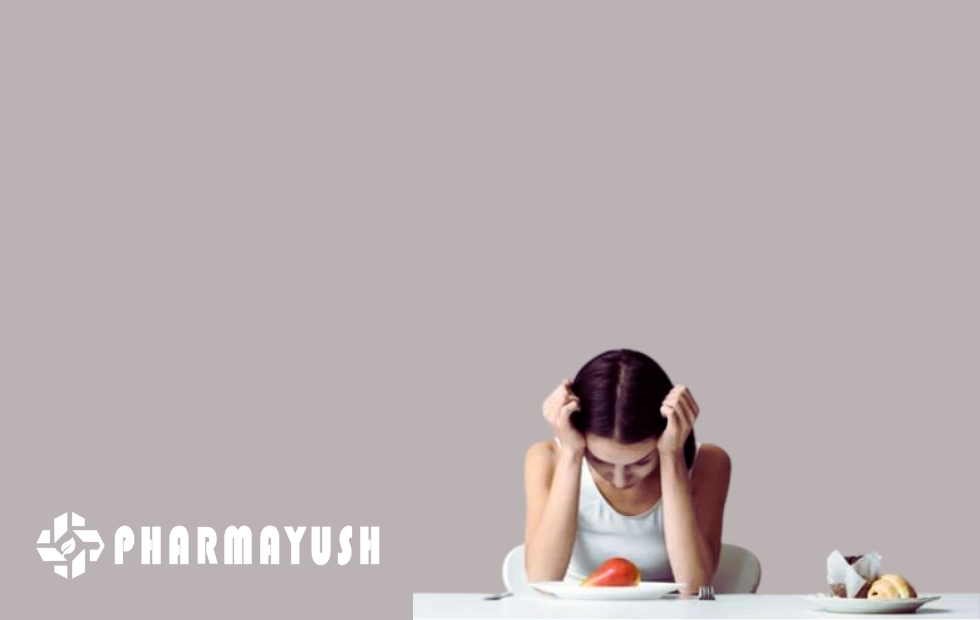Description
Eating disorder is a mental health condition characterized by abnormal eating behaviors and distorted body image. Eating disorders cause serious issues.

Eating disorder is a mental health condition characterized by abnormal eating behaviors and distorted body image. Eating disorders cause serious issues.
Common types of eating disorders include anorexia nervosa, bulimia nervosa, and binge-eating disorder. Eating disorders can have serious physical and emotional consequences, including malnutrition, gastrointestinal problems, depression, and anxiety.
Treatment for eating disorders typically involves a combination of psychotherapy, medication, and nutritional counseling. Ayurveda can be a helpful complementary therapy for the treatment of eating disorders, as it offers a holistic approach to health that addresses both the physical and emotional aspects of the disorder. Ayurvedic treatments for eating disorders may include counseling to address the underlying psychological and emotional factors, lifestyle changes to support overall well-being, and dietary changes to promote healthy eating habits.
It is complex and multifactorial, and can vary from person to person. Some common factors that may contribute to the development of eating disorders include:
It is important to note that while these factors may contribute to the development of an eating disorder, they do not necessarily cause the disorder. Eating disorders are complex and multifaceted conditions that require comprehensive treatment that addresses the physical, emotional, and psychological aspects of the disorder.
Anorexia nervosa is an eating disorder characterized by a persistent restriction of food intake, an intense fear of gaining weight or becoming fat, and a distorted body image.
Some common symptoms of anorexia nervosa include:
Bulimia nervosa is an eating disorder characterized by a cycle of binge eating followed by compensatory behaviors such as vomiting, fasting, or excessive exercise.
Some common symptoms of bulimia nervosa include:
Trikatu : Trikatu is a combination of three herbs - ginger, black pepper, and long pepper. It is a traditional Ayurvedic remedy used to stimulate digestion and improve appetite. It helps to balance the vata and kapha doshas and enhances the digestive fire.
Dosage:Trikatu is typically taken as a powder or in tablet form. The recommended dosage may vary depending on the individual's needs and the specific formulation of the supplement. However, a general dosage guideline for Trikatu is:
Chitrakadi Vati : Chitrakadi Vati is an Ayurvedic herbal tablet that contains a blend of various herbs such as ginger, black pepper, cumin, and cinnamon. It helps to improve digestion and appetite, and also reduces flatulence and abdominal discomfort.
Dosage: Chitrakadi Vati is typically taken as a tablet, either before or after meals. The recommended dosage may vary depending on the individual's needs and the specific formulation of the supplement. However, a general dosage guideline for Chitrakadi Vati is:
Hingvastak Churna : Hingvastak Churna is a mixture of various herbs and spices, including asafoetida, ginger, cumin, and black pepper. It helps to balance the vata dosha and improve digestion, which in turn can help to increase appetite.
Dosage: Hingvastak Churna is typically taken as a powder, mixed with warm water or honey. The recommended dosage may vary depending on the individual's needs and the specific formulation of the supplement. However, a general dosage guideline for Hingvastak Churna is:
Ashwagandha : Ashwagandha is an adaptogenic herb that helps to reduce stress and improve overall health and vitality. It can also help to improve appetite and digestion by balancing the vata and pitta doshas. The primary active compounds in ashwagandha are alkaloids and steroidal lactones, also known as withanolides. These compounds are believed to contribute to the herb's adaptogenic properties, which help the body cope with stress and promote balance and homeostasis.
Dosage: The general dosage range for ashwagandha powder is typically 1-2 teaspoons (about 3-6 grams) per day, divided into two doses
Triphala : Triphala is a blend of three fruits, amla, haritaki, and bibhitaki, and is a potent digestive tonic. It helps to improve digestion and elimination, and may help to reduce symptoms of bloating and gas that may be associated with bulimia.
Dosage: The recommended dosage of Triphala may vary depending on the individual's needs and the specific formulation of the supplement. However, a general dosage guideline for Triphala is:
Brahmi : Brahmi is a powerful herb that is used in Ayurveda to promote mental clarity, reduce stress and anxiety, and improve cognitive function. It may be helpful in treating the psychological symptoms associated with bulimia.
Dosage: The recommended dosage of Brahmi may vary depending on the individual's needs and the specific formulation of the supplement. However, a general dosage guideline for Brahmi is:
It is important to consult a qualified Ayurvedic practitioner before taking any of these, as the dosage and usage may vary depending on the individual's constitution, health condition, and other factors. Additionally, it is recommended to only take these under the guidance of a qualified practitioner, as it may interact with certain medications or have contraindications for some health conditions.
Ayurveda can provide a holistic approach to treating eating disorders by addressing the physical, emotional, and mental aspects of the condition. Personalized treatment plans that consider an individual's unique constitution, symptoms, and underlying imbalances are crucial for success in Ayurvedic treatment. Dietary changes, herbal remedies, lifestyle modifications, and psychological support are some of the treatments that can be used to address eating disorders. Ayurvedic herbs can be beneficial in improving digestion, reducing anxiety and stress, and supporting overall health and well-being. It is important to seek the guidance of a qualified Ayurvedic practitioner when using Ayurveda to treat eating disorders. A balanced lifestyle is also essential for maintaining overall health and well-being.
All your ayurvedic medical needs can be fulfilled by PHARMAYUSH, an online platform for all ayush medicines and products, where customers can buy ayurveda, siddha, unani, cosmetic products and homeo medicines in a single online platform.